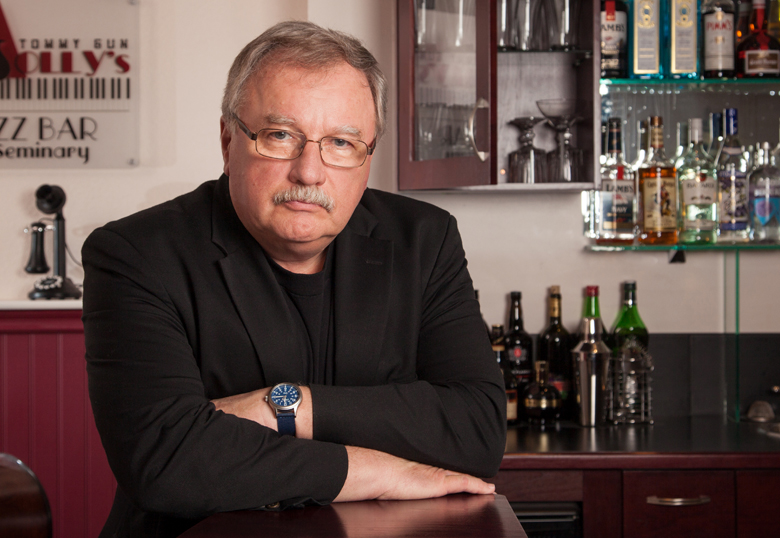Research can be like any expedition – sometimes your proposed route isn’t near as interesting as the side road upon which you happen.
For Dr. Tom Robinson (religious studies), one of those side roads led to an unintended research project and eventual biography of a superstar child evangelist who had previously been ignored in scholarly circles. Her story, and its broader representation of a tumultuous time in American history, is the subject of Robinson’s PUBlic Professor series talk on Thursday, Feb. 15, 2018, 7 to 9 p.m. at the Lethbridge Lodge.

Robinson will present Sex, Drugs, Jesus, and Gin as he explores the “Roaring Twenties”, an age of clashes and conflicts, and the life of Uldine Utley, a child evangelist as widely known in her day as the child stars of Hollywood.
He was researching another project when he stumbled upon a column about a girl evangelist that piqued his interest. He skimmed some more articles about her and the phenomenon of child evangelists and was about to resume his intended path of study when he noticed an oddity about the data.
“Clearly there were more references to girl evangelists in the 1920s and 1930s than in any other decade. They were always present, but always fewer than the references to boy evangelists, except in the 1920s and 30s,” says Robinson. “The why question just jumped out at me. I looked at it and basically said ‘You can’t leave that one’.”
The evangelist, Utley, was a true superstar of the times. She began her preaching career at age 11, published a monthly magazine by 12, and by the age of 14 was regularly filling the largest venues in major American cities, including Carnegie Hall and Madison Square Garden. And while authors rarely say a book is easy to write, Robinson admits that the subject matter, the era and the lack of previous study on Utley essentially begged him to put pen to paper.
“Working in a small department like we have here, you teach everything to do with the area you’re in, so while my specialty is considered Christianity in the Roman Empire, I had the opportunity to explore this,” he says. “You never really know if this hampers your work in your primary field, but at the same time you are in control of things and you make your own choices. In this instance, when something falls into your lap that hasn’t been worked on, it’s rare you get that opportunity, so you go with it.”
As Robinson dove deeper into the subject, he discovered that Utley, who passed away in 1995, had a surviving niece and nephew. Meeting with them unearthed a treasure trove of assets, including a cache of unpublished poems that painted a complex portrait of a tortured young woman struggling to uphold the expectations of revivalism against her desire for a normal life.
This contradiction is Robinson’s bailiwick. A faculty member at the U of L for 31 years (he retired this past spring), Robinson says he has always approached issues from a critical perspective, looking at consensus and asking whether the popular theory actually holds up against critical analysis. His study of religion has been the result of a lifelong interest in the subject, having grown up in what he calls a “fairly pious family”. His bachelor studies at the University of New Brunswick focused on philosophy and ancient Greek language, before he pursued a Master’s in Biblical Studies at Vancouver’s Regent College and a PhD in Religious Studies at McMaster University in Hamilton.
Looking back over his career, Robinson sees a university that has continued to evolve as it has grown, reflected by the students in his classes.
“In my first years here, that I would have a Muslim or a Hindu student in class would be quite rare. Now, in Religious Studies 1000 we have about 280 students and every semester we have lots of Muslim students, quite a few Hindu students, Sikh students and a mixture of people in Christian traditions. That’s a significant change and reflective of the diversity of our student body.”
The study of religion, and religion itself, will likely never go away, he says, if only because the human experience necessitates some sort of support mechanism, which many have found and still find in religion.
“Will humans ever develop beyond some sort of religious sensibility or some sense of mystery? I think that’s a long way off,” he says. “There’s no doubt that religion can be damaging but it can also be stabilizing. If all the world became prosperous, everyone had no uncertainties, a new car in the garage and a Costco membership, maybe religion would suffer. But I would guess there are enough irregularities of human life that religion will be here as a resource for a long time.”
For a look at the PUBlic Professor Series and upcoming talks, check out this website.

